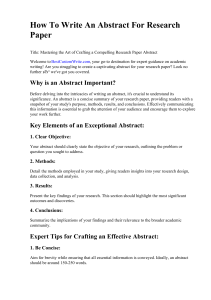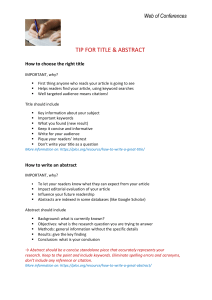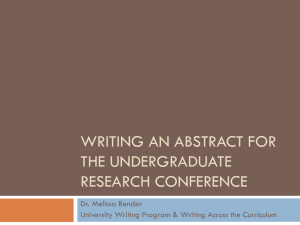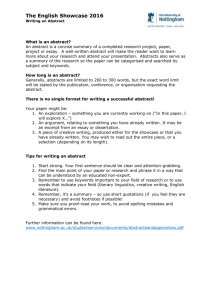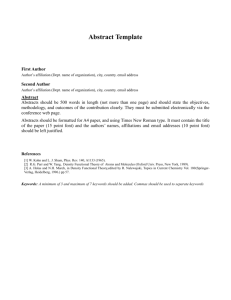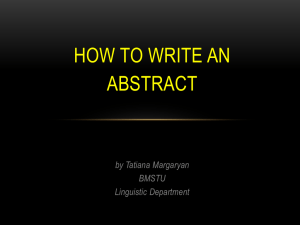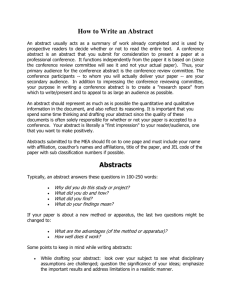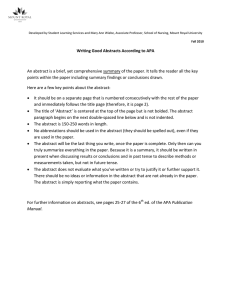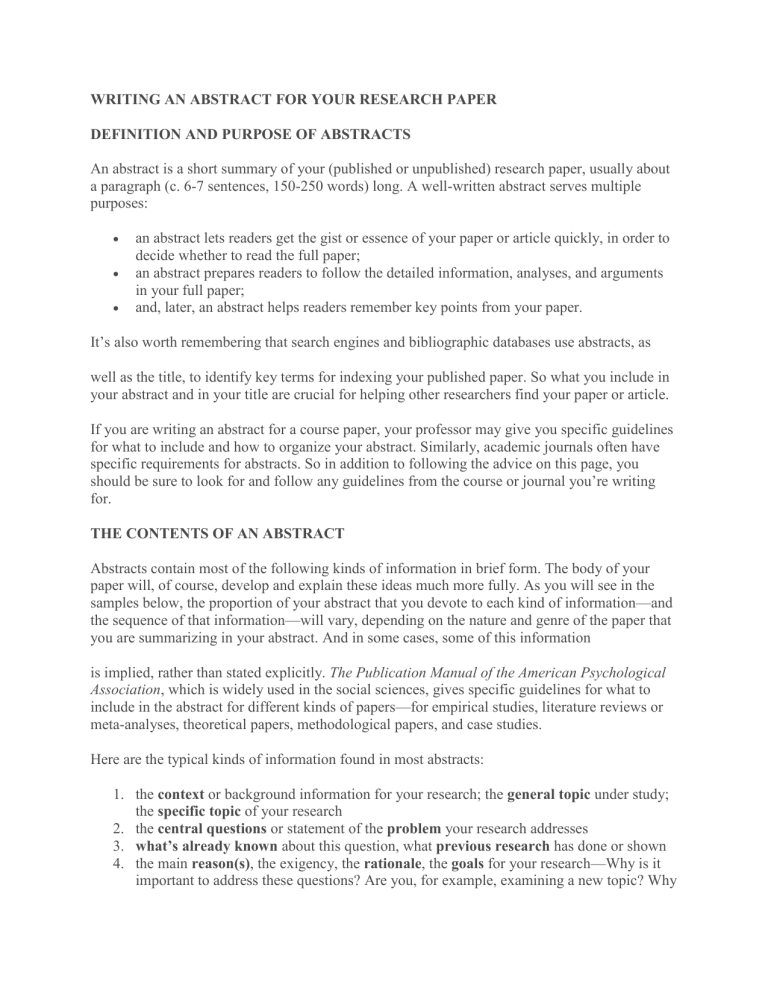
WRITING AN ABSTRACT FOR YOUR RESEARCH PAPER DEFINITION AND PURPOSE OF ABSTRACTS An abstract is a short summary of your (published or unpublished) research paper, usually about a paragraph (c. 6-7 sentences, 150-250 words) long. A well-written abstract serves multiple purposes: an abstract lets readers get the gist or essence of your paper or article quickly, in order to decide whether to read the full paper; an abstract prepares readers to follow the detailed information, analyses, and arguments in your full paper; and, later, an abstract helps readers remember key points from your paper. It’s also worth remembering that search engines and bibliographic databases use abstracts, as well as the title, to identify key terms for indexing your published paper. So what you include in your abstract and in your title are crucial for helping other researchers find your paper or article. If you are writing an abstract for a course paper, your professor may give you specific guidelines for what to include and how to organize your abstract. Similarly, academic journals often have specific requirements for abstracts. So in addition to following the advice on this page, you should be sure to look for and follow any guidelines from the course or journal you’re writing for. THE CONTENTS OF AN ABSTRACT Abstracts contain most of the following kinds of information in brief form. The body of your paper will, of course, develop and explain these ideas much more fully. As you will see in the samples below, the proportion of your abstract that you devote to each kind of information—and the sequence of that information—will vary, depending on the nature and genre of the paper that you are summarizing in your abstract. And in some cases, some of this information is implied, rather than stated explicitly. The Publication Manual of the American Psychological Association, which is widely used in the social sciences, gives specific guidelines for what to include in the abstract for different kinds of papers—for empirical studies, literature reviews or meta-analyses, theoretical papers, methodological papers, and case studies. Here are the typical kinds of information found in most abstracts: 1. the context or background information for your research; the general topic under study; the specific topic of your research 2. the central questions or statement of the problem your research addresses 3. what’s already known about this question, what previous research has done or shown 4. the main reason(s), the exigency, the rationale, the goals for your research—Why is it important to address these questions? Are you, for example, examining a new topic? Why is that topic worth examining? Are you filling a gap in previous research? Applying new methods to take a fresh look at existing ideas or data? Resolving a dispute within the literature in your field? . . . 5. your research and/or analytical methods 6. your main findings, results, or arguments 7. the significance or implications of your findings or arguments. Your abstract should be intelligible on its own, without a reader’s having to read your entire paper. And in an abstract, you usually do not cite references—most of your abstract will describe what you have studied in your research and what you have found and what you argue in your paper. In the body of your paper, you will cite the specific literature that informs your research. CHOOSING VERB TENSES WITHIN YOUR ABSTRACT The social science sample (Sample 1) below uses the present tense to describe general facts and interpretations that have been and are currently true, including the prevailing explanation for the social phenomenon under study. That abstract also uses the present tense to describe the methods, the findings, the arguments, and the implications of the findings from their new research study. The authors use the past tense to describe previous research. . Be sure the abstract has everything you need—no more, no less. An abstract should be between 200 and 250 words total. Readers should be able to quickly grasp your purpose, methods, thesis, and results within the abstract. You need to provide all this information in a concise and coherent way. The full-length article or presentation is for providing more details and answering questions. For a conference presentation, it may also be necessary to narrow in on one particular aspect of your research, as time may prevent you from covering a larger project. In addition, an abstract usually does not include citations or bibliographic references, descriptions of routine assessments, or information about how statistics were formulated. Note also that while some comments on the background may be included, readers are going to be most interested in the particulars of your specific project and your particular results. Use keywords. In the age of electronic database searches, keywords are vital. Keywords should be added in a separate line after your abstract. For example, the American Psychological Association recommends using natural language— everyday words you think of in relation to your topic—and picking three to five keywords (McAdoo 2015). For example, keywords for a study on hawks might include: hawks, prey, territory, or behavior. Make your title strong. Your title is your first impression—it’s your chance to draw in your readers, such as conference reviewers, colleagues, and scientists outside your field. Before your abstract will be read, your title must catch their eye first. In no more than 12 words, the title should convey something about your subject and the “hook” of your research as concisely and clearly as possible. Focus on what you investigated and how. Don’t repeat your title in your abstract though; you will need the space for the details of your study in your abstract. Tip: Using active verbs can strengthen a title. A brief search of scientific articles brought up titles with verbs like “mediate,” “enhance,” and “reveal.” Use a thesaurus or style guide for more ideas for strong verb choices. Because you have to put so much into a short body of text, writing an abstract can definitely be challenging. As with any writing, it helps to practice as well as to study other examples.
